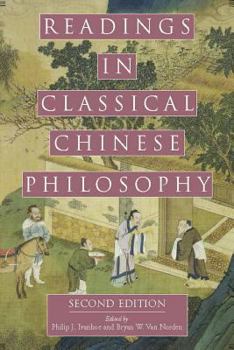Readings in Classical Chinese Philosophy
Select Format
Select Condition 
Book Overview
This new edition offers expanded selections from the works of Kongzi (Confucius), Mengzi (Mencius), Zhuangzi (Chuang Tzu), and Xunzi (Hsun Tzu); two new works, the dialogues Robber Zhi and White Horse... This description may be from another edition of this product.
Format:Paperback
Language:English
ISBN:0872207803
ISBN13:9780872207806
Release Date:December 2005
Publisher:Hackett Publishing Company
Length:416 Pages
Weight:1.23 lbs.
Dimensions:0.9" x 6.0" x 9.0"
Customer Reviews
4 ratings
Just as described
Published by Thriftbooks.com User , 15 years ago
Items arrived on time and was in great condition. Would purchase from seller again.
Great introduction to Classical Chinese philosophy
Published by Thriftbooks.com User , 16 years ago
This anthology is comprised of various selections by China's most notable classical philosophers: primarily Confucius, Mozi, Mencius, Laozi, Zhuangzi, Xunzi, and Han Feizi. With these philosophers, the book introduces Confucianism and the thinkings of Confucius's disciples, who often interpreted his teachings in very different ways, and the book also introduces philosophies/ways of thinking that developed as reactions to Confucius, namely Han Feizi's Legalism. The Daoist way is also introduced via the inclusion of the Daodijing, a number of short poems that eludicate the Way. There is little commentary on the selections themselves, perhaps for the best, as I find studying Chinese philosophy to be a deeply personal and spiritual experience, but the introductions of each philosopher are particularly helpful in giving some historical background, and connecting each philosopher with not only each other, but also with the problems of their times. Many of these men were government officials, so it becomes interesting to see that occasionally, the development of their philosophies is related to the course of politics at the time. Readings in Classical Chinese Philosophy is a wonderful introduction to Chinese philosophy, and as often it only contains selections of each philosopher (for example, only parts of Confucius's Analects), the more serious student should consider supplementing the book with the complete texts.
An Excellent Overview!
Published by Thriftbooks.com User , 21 years ago
I got this book as a textbook for a class that I subsequently dropped, but I decided that as long as I had it, I might as well read it. I'm glad I did! This book is a wonderful overview of the greatest Chinese philosophers. Each section begins with a few pages recounting what is known about each philosopher covered and what their central beliefs are. In addition, the actual texts are heavily footnoted with explanations of the language, pertinant cross references, and other little facts that make the reading both more informative and more enjoyable. This is a wonderful book for anyone who's looking to get a decent understanding of the 'big name' Chinese philosophers, and will help anyone looking to show off at parties ;) Even if you're not taking a class, this is a wonderful book.
An Excellent Anthology!
Published by Thriftbooks.com User , 22 years ago
Being interested in Chinese philosophy, I recently purchased this anthology, edited by Drs. P. J. Ivanhoe and Bryan W. Van Norden, which contains excellent translations of the selections of seven classical Chinese thinkers: Mozi, Han Feizi, Kongzi, Xunzi, Mengzi, Laozi, and Zhuangzi. Despite being a beginner when it comes to Chinese philosophy, I find all the translations to be very readable and the notes and interpretative material, generally, to be sufficient. (more on this later)The appendices--Important Texts, Important Periods, Important Terms, Important Figures--are also quite helpful if you need further information/clarification on a particular term or figure. The only two things that disappointed me about this anthology are as follows:(1) The use of "filial piety" as a transation for xiao (hsiao). The term filial piety was first used by James Legge back in the 1861. And, as scholars such as Dr. David Li have pointed out, Kongzi (Confucius) never in his life spoke about religion. So, why Dr. Slingerland, who translated the Analects section of the book, continues to use it (see Analects 2.7, p.5) mystifies me. (Dr. Van Norden, I believe, in his translation of selections of the Mengzi, also translates xiao as filial piety.)(2) The notes accompanying Dr. Slingerland's translation of the Analects are, I think, somewhat banal. For example, he points out in 1.9 that Zengzi is a disciple of Kongzi; yet, he does not point out that 2.1 is the Analects first statement regarding government. However, his notes increase in frequency and quality as the translation continues. I HIGHLY recommend this anthology; it is probably the best anthology and sourcebook of early Chinese philosophy currently available. This book is not only valuable to students and scholars but also general readers because never has there been so many great translations of so many thinkers in one reasonably priced paperback. The anthology contains the complete "Daodejing of Laozi" which Dr. Ivanhoe has published as separate book, which makes it a even better deal because not only do you get very scholarly and readable translations of all major classical Chinese thinkers, you also get an entire book included within it.Hopefully, in a future edition of the book, the editors will consider expanding the volume to include translations of selections of Zhu Xi's works (a very important Neo-Confucian), Dai Zhen (whose translated writings have never been published), and the writings of other Chinese philosophers. - Jeff McCausland





